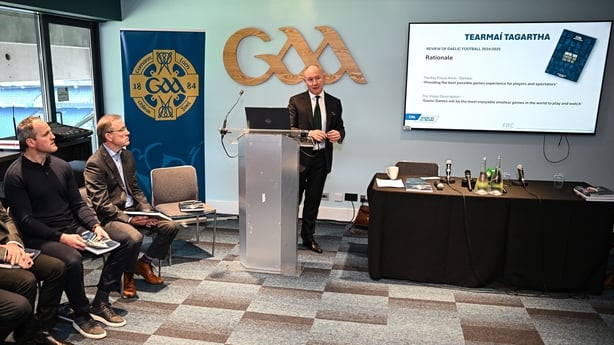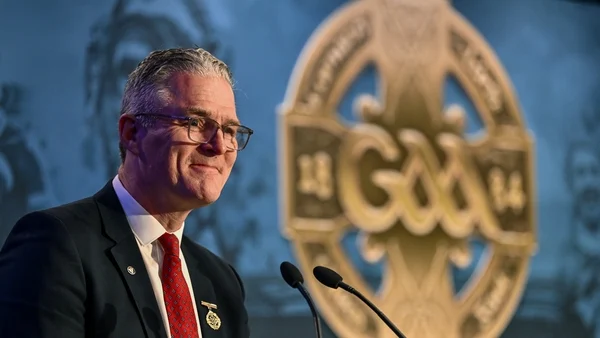A crucial month is upcoming for Gaelic football. Next Friday and Saturday will see interprovincial matches at Croke Park, where the proposed changes that the GAA's Football Review Committee have come up with, will be trialled.
On 26 October, Central Council will meet to review the seven proposals, to ratify or otherwise for a Special Congress on 30 November. Whatever is decided will be in place for the whole of 2025, with a full review taking place at another Special Congress late next year ahead of the adoption into the updated rulebook for 2026.
Running the rule: Proposed changes to Gaelic football
So, that's the timeline ahead.
"When Jim Gavin and his incredible committee began to look back at the results coming in from the surveys, people said they wanted to see more kicking, catching, more one-to-one competition, and long-range scores.
"That has been their north star really and now it's a case of what we can do to create that."
Expanding further on the four principles just referenced, Burns added: "Those principles are what we used to see a lot more often in the game, where you used to kick the ball and hope for the best. As a midfielder that was something that I always had to cultivate, that was the high catch.
"Another one of the things that people would have debated would be the battle between the corner-back and corner-forward. "That is gone now because of the way we are setting it up. A lot of these rule enhancements are trying to get those basic principles into the game."

As for the proposed rule where a team must keep any three outfield players in each half of the field, the Armagh native said the association has such a rule already in place in one of its games.
"Holding three players back is something that will create space because if we want to see good forward play and good scores, forwards need space to operate in and it's the job of the defender to cut down on space. There is a Gaelic game where you have to hold three back and that is and that is wheelchair hurling. I was at the interprovincials in Carlow a couple of weeks ago and I felt it helped the game whenever three had to be held back because it allowed a little more space for the forwards to operate."
All told, seven rule enhancements have been proposed by the FRC, not a case of too many at the one time, says the man who won an Ulster title as a player in 1999.
"It's definitely not too many together because you have to remember that 2025 is a rule-change year and a year that allows us to experiment. If we are going to do it we have to be very responsible in how we are going to do it; we can't be throwing things in for the sake of it.
Traditionally what would have happened is that you would have a very long Congress. I remember the one in Down in a rule-change year and it was almost like the wild west, a motion here and a motion there. We have to do it strategically and we have to prepare for it, so this year in the first year of my presidency was preparing for it. We have Special Congress to come and a Central Council meeting this week where we are going to look at the changes and to see how many of them are going to become motions.
"There is a difference between a rule and a motion going to a Congress and to get that on to the rule book. It becomes very technical. They will then come in for a year and then this time next year we'll have another Special Congress to see how many actually come in permanently.
"The difference between this year and other rule-change years is we would have seen experiments done in the league and in University competitions, this is going for the whole year, championship and all. Right from the word go coaches will be aware that this is something we will have to be ready for if all of the proposed changes come in."
In a wide-ranging interview with presenter Marie Crowe, Burners alluded to the pressure on club and inter-county managers to deliver, when saying: "Managers are much maligned. They get the blame for everything. People blame managers and coaches for the way Gaelic football is played today.
"Managers put in an incredible amount of time in thinking and preparing and having to get their teams ready. Some times they can have a hostile relationship with the media, particularly local media and that can create its own narrative.
"One of the committee we have going is the amateur status committee - we haven't looked at the amateur status since 1997, in that what does it mean to be a GAA inter-county player in 2024 and what does it mean to be a manager? I think there will be a debate on whether we should put managers on contract. because it is nearly a full-time job, the amount of accountability is there. Even when you are winning there can be difficulty listening to criticism.
"I have great sympathy for manager and I take my hat off to them. They don't do it for the money, they do it because they want to be part of something bigger.
As for the bainisteoir getting a regulated contract of sort, the president would not be drawn, stating: "That is a big philosophical question to answer. I don't have any executive power in the GAA.
"We all know for many, many years that generous expenses have been given to managers and I'm not going to comment on that and you don't comment on what you don't know."
On his leadership style, he said: "I like to lead people by consensus and by trusting by the job I give them to do."




